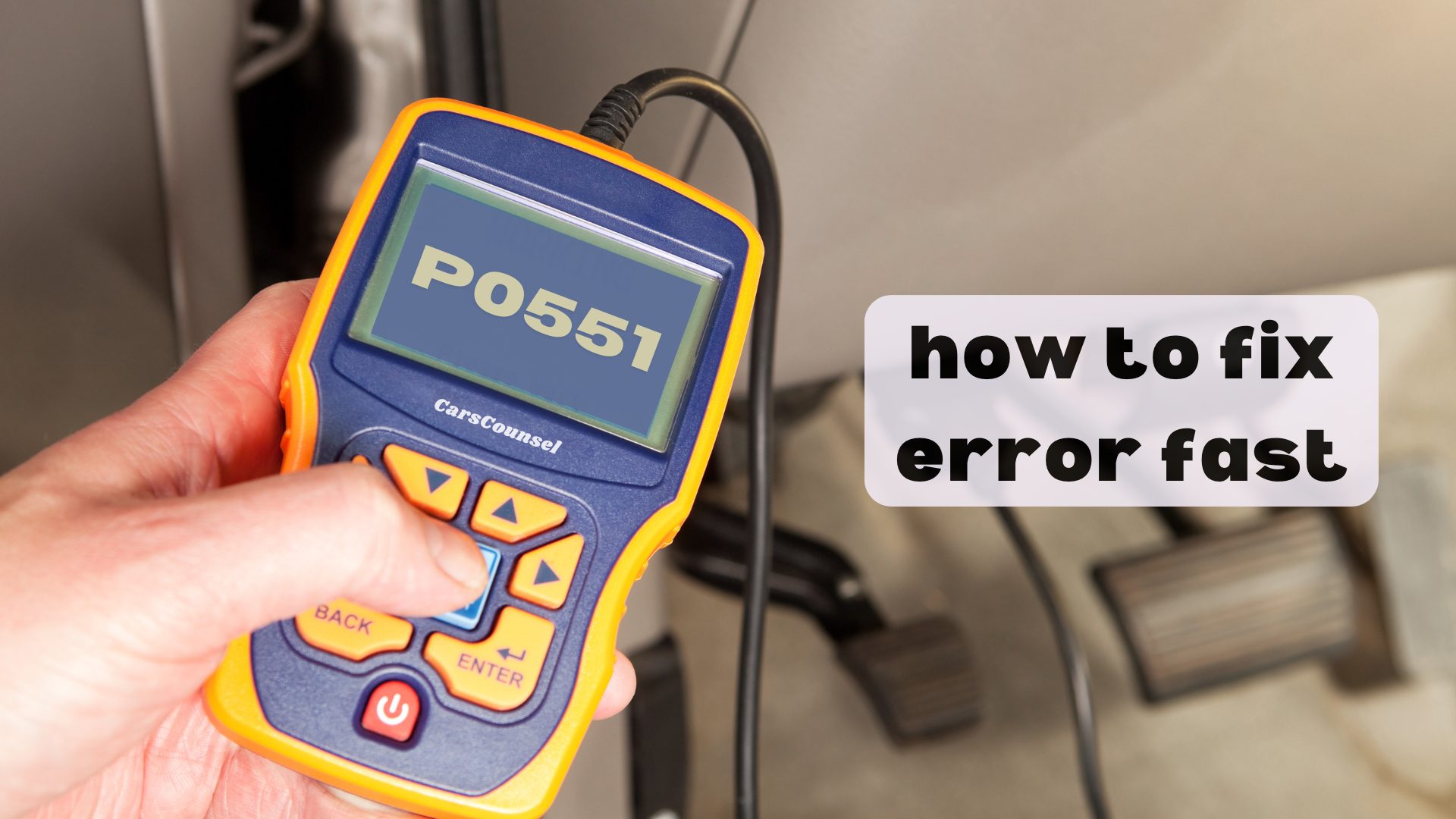When dealing with the P0551 code, start by identifying the symptoms, understanding the common causes, and knowing how to perform basic checks.
This error usually points to a bad power steering pressure sensor, but it could also mean there’s damaged wiring or incorrect voltage levels.
Before you begin, disconnect the battery to avoid any electrical problems.
How can you make sure you fix the main issue and avoid it happening again?
Follow this step-by-step guide to fix the error code quickly and get your car back on the road smoothly.

Quick Navigation
Key Takeaways
- Swap out the broken power steering pressure sensor to fix bad readings.
- Look over and fix any damaged or rusty wires connected to the sensor.
- Check and refill the power steering fluid to keep the system pressure right.
- Use an OBD-II scanner to read and clear error codes after making repairs.
Understanding the P0551 Code
The P0551 code means there’s a problem with the power steering pressure sensor, which can cause warning lights to come on and make steering harder. This code shows that your car’s power steering system isn’t working right, and you need to fix it soon.
The power steering pressure sensor keeps an eye on the hydraulic pressure in the system. If this sensor isn’t working, it sends wrong information to your car’s computer, causing the P0551 code to pop up.
Common reasons for this include broken sensors, damaged wiring, or problems with the power steering pump. Also, having low power steering fluid can make things worse.
Knowing about these error codes helps keep your car running safely and smoothly.
Symptoms of P0551
If you have a P0551 code, you might see warning lights on your dashboard, find it harder to steer, or notice sudden changes in how your car handles. These problems mean your steering isn’t working as well as it should, making it tougher to drive.
You could also hear strange noises when you turn the steering wheel, which could be a sign of other issues. It’s important to keep your power steering fluid at the right level and clean. Low or dirty fluid can make things worse.
Regularly checking and filling up the power steering fluid can help stop these problems. You might also notice changes in steering pressure, making your drive less smooth. Fixing these issues quickly is key to keeping your car safe and easy to handle.
Common Causes
Several things can cause the P0551 code, mainly issues with the power steering pressure sensor, wiring problems, or leaks in the power steering fluid. Knowing these causes helps in figuring out and fixing the problem.
Here are the main reasons:
- Bad Power Steering Pressure Sensor: If the sensor isn’t working right, it gives wrong readings, leading to the P0551 code.
- Wiring Problems: Issues like damaged or corroded wires can mess up communication in the system.
- Power Steering Fluid Leaks: Leaks lower the fluid levels, affecting system pressure and causing the error code.
Affected Car Models
Many car models, including the Ford Explorer, Dodge Charger, Chevrolet Suburban, Chrysler 300, and Nissan Altima, often show the P0551 code. This error is crucial for car upkeep and steering safety because it can affect how well your vehicle handles and controls. Knowing which models are likely to have this issue can help you keep your car in good shape.
| Car Model | Common Issue | Maintenance Tip |
|---|---|---|
| Ford Explorer | Pressure Sensor Fault | Check the sensors regularly |
| Dodge Charger | Pressure Sensor Circuit Issues | Inspect the wiring connections |
| Chevrolet Suburban | System Pressure Problems | Keep an eye on the power steering fluid levels |
| Chrysler 300 | Sensor and Circuit Malfunctions | Do routine diagnostic scans |
Keep an eye on these models to ensure your steering is safe and your car performs well.
Visual Inspection Steps
To start, check the power steering system for any obvious signs of damage, loose parts, or leaks in the wires, hoses, and connectors. Use good visual inspection methods to spot problems quickly. Pay close attention to these main areas:
- Wiring and Connectors: Look for damaged wires, rust, or loose connections that might affect the sensor circuit.
- Hoses: Check for any cracks, bulges, or leaks that could mess up the power steering fluid flow.
- Power Steering Pressure Sensor: Make sure the sensor is properly connected and not damaged.
These steps are crucial for a detailed check of the sensor circuit, which helps you find the cause of the P0551 code quickly.
Catching these issues early can save time and avoid bigger problems later.
Checking Fluid Levels
After you’ve finished looking over everything, the next thing to do is check the power steering fluid levels to make sure they match what the manufacturer suggests.
Find the power steering reservoir, which usually has a steering wheel symbol on it. Take off the cap and use the dipstick to check the fluid level. If it’s low, add the right kind of power steering fluid.
Keeping the fluid at the right level is important because low or dirty fluid can cause problems with system pressure and set off the P0551 code.
Make it a habit to check these levels regularly to keep your vehicle running smoothly and avoid future issues.
Always look at your vehicle’s manual for specific instructions and fluid recommendations.
Using an OBD-II Scanner
To diagnose the P0551 code, you’ll need to use an OBD-II scanner. Here’s how to do it:
- Find the Diagnostic Port: This is usually located under the dashboard on the driver’s side.
- Connect the Scanner: Plug the scanner into the diagnostic port.
- Get the Codes: Turn the ignition on and follow the scanner’s instructions to read and record the error codes.
By following these steps, you can find out if the P0551 code is present and gather the information needed for further diagnostics.
Make sure your scanner can read power steering diagnostics and live data.
Multimeter Testing
Using a multimeter, you can check the power steering pressure sensor circuit to spot any voltage problems and figure out if the sensor or wiring is faulty.
First, make sure your multimeter is calibrated correctly to get accurate readings. Set the multimeter to the right voltage range and connect the probes to the sensor terminals. You should see voltage signals that match what the manufacturer says they should be.
If they’re different, there’s a problem. Be thorough by checking the wiring harness for continuity and looking for any shorts or open circuits.
If the readings are off, the issue might be with the sensor or the wiring. Accurate multimeter testing helps you find problems quickly, making it an important step in fixing the P0551 code.
Performing Pressure Tests
After confirming the sensor works with a multimeter, you should test the power steering system’s pressure to make sure it’s functioning properly.
Here’s what you’ll need and how to do it:
- Hook Up the Pressure Gauge: Connect the gauge to the power steering system’s test port. Make sure it’s tight and doesn’t leak.
- Start the Engine: Turn on the engine and watch the pressure readings. Check them while the car is idling and while you turn the steering wheel.
- Check Against Standards: Compare your pressure readings with what the manufacturer says they should be. Look for any differences.
These steps will help you see if the power steering pressure is normal, making sure your system works well and is safe.
Fixing the P0551 Code
When fixing the P0551 code, start by replacing the faulty power steering pressure sensor, which often causes this problem.
Make sure to disconnect the battery before you begin to avoid any electrical hazards.
Once you’ve replaced the sensor, check the wiring connected to it. Look for any signs of wear, corrosion, or damage that might need fixing.
Use a multimeter to test the circuit and ensure the voltage levels are correct. If you find any damaged wiring, repair or replace it to get things working properly again.
After doing all this, clear the code with an OBD-II scanner and take the car for a test drive to make sure the problem is fixed.
Regular maintenance can help prevent this issue from happening again.
More OBD-II Codes
Frequently Asked Questions
Can Driving With a P0551 Code Damage Other Vehicle Components?
Driving with a P0551 code can harm other parts of your car. Symptoms like steering problems and fluid leaks can put extra stress on the power steering pump. Fixing the P0551 code quickly can stop more damage and keep your car safe to drive.
How Long Does It Take to Fix a P0551 Code Issue?
Surprisingly, fixing a P0551 code doesn’t take a long time. It can take about an hour for simple sensor replacements or a few hours if there are wiring issues or if the power steering pump needs to be replaced.
Does a P0551 Code Affect Vehicle Performance or Fuel Efficiency?
Yes, a P0551 code can affect how your vehicle performs. This code can make steering harder, which impacts control. Diagnosing a P0551 code helps find the problem, making sure your vehicle’s performance and fuel efficiency aren’t hurt by steering issues.
Are There Any Temporary Fixes for the P0551 Code?
Think of it like putting a Band-Aid on a big cut. Temporary fixes might include adding more power steering fluid or resetting the code, but these won’t solve the real problem. You need to fix the main issue for a lasting solution.
Can a P0551 Code Trigger Other Diagnostic Trouble Codes?
Yes, a P0551 code can cause other error codes to pop up. Often, this code is related to low fluid levels, so make sure to check the fluid during the diagnosis. Ignoring it could lead to steering problems or more error codes.
Conclusion
You now have the tools to quickly fix the P0551 code.
Start by replacing the bad power steering pressure sensor.
Check and repair any wiring issues, and use a multimeter to check the voltage.
Don’t forget to clear the code with an OBD-II scanner and take the car for a test drive.
Usually, the sensor is the main problem, so this should be a straightforward fix if you follow these steps.

